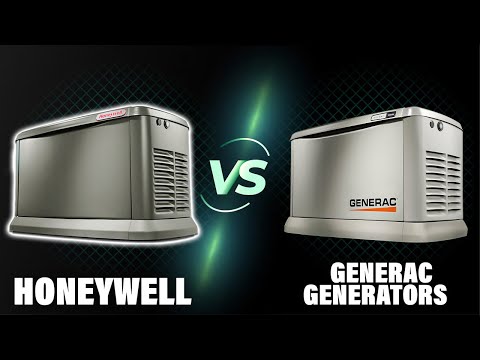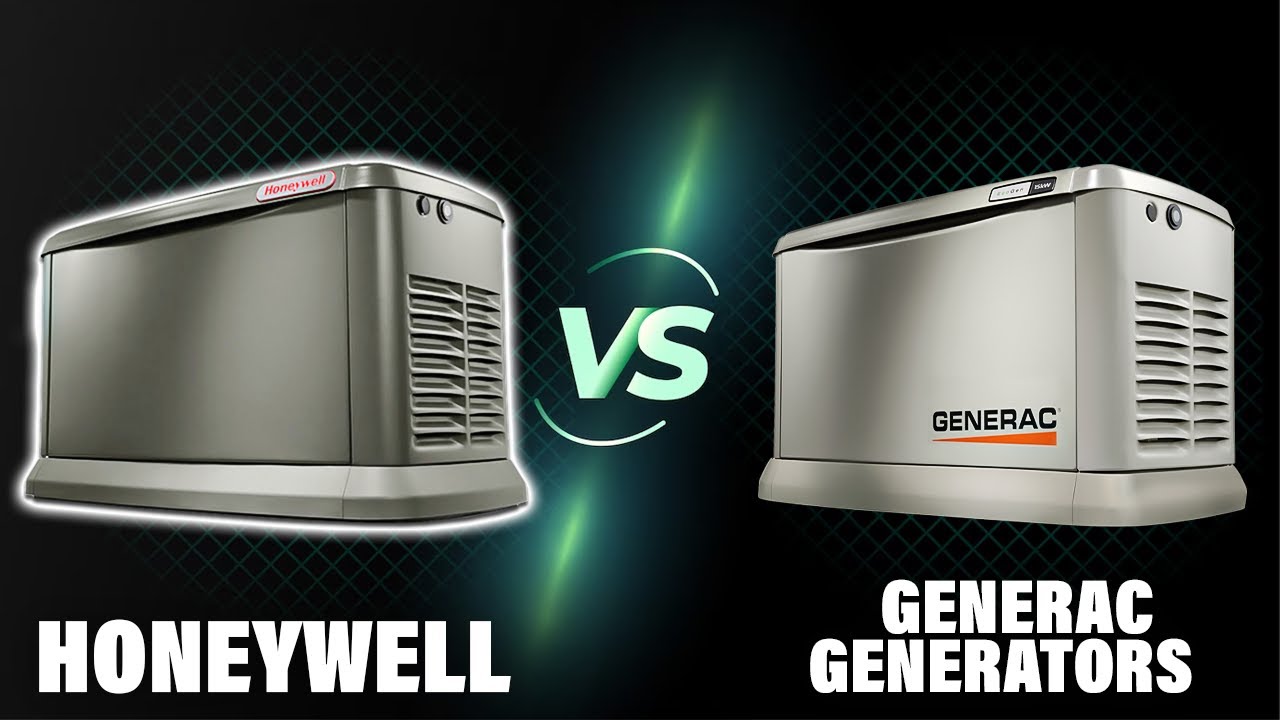Honeywell and Generac generators are two well-known brands in the market, each offering unique features that cater to different needs. The difference between these two brands lies in their technology, reliability, and versatility. Honeywell generators are known for their advanced technology and innovative features. They utilize state-of-the-art electronics and sensors to provide precise power output, ensuring sensitive electronics and appliances are protected from voltage fluctuations. With their QuietPower™ Technology, Honeywell generators operate quietly, allowing for a peaceful environment during power outages. Their durable construction and reliable engines make them suitable for both residential and commercial use. On the other hand, Generac generators are renowned for their reliability and robustness. They are designed to withstand harsh weather conditions and can provide power for extended periods. Generac generators are equipped with TruePower™ technology, which delivers clean and stable power, making them ideal for powering sensitive electronics and appliances. Their user-friendly controls and versatile options, such as portable, standby, and whole-house generators, make them suitable for various applications. Whether you prioritize advanced technology and quiet operation or reliability and versatility, both Honeywell and Generac generators offer reliable power solutions for your needs. Choosing between them ultimately depends on your specific requirements and preferences.

Difference Between Honeywell and Generac Generators
| Aspect | Honeywell Generators | Generac Generators |
|---|---|---|
| Company Background | Honeywell, a renowned multinational conglomerate, has been operating since 1906. They are known for their expertise in various industries, including aerospace, building technologies, and power generation. | Generac, founded in 1959, specializes exclusively in designing and manufacturing power generation equipment. They are the leading provider of backup power solutions in North America. |
| Product Range | Honeywell offers a diverse range of generators, catering to both residential and commercial needs. Their product line includes portable, standby, and inverter generators, ensuring reliable power supply in any situation. | Generac focuses primarily on standby generators, ranging from small residential units to large industrial systems. They offer a wide selection of automatic standby generators that seamlessly provide backup power during outages. |
| Technology and Innovation | Honeywell generators incorporate advanced features such as Wi-Fi connectivity, mobile monitoring, and fuel-efficient engines. They prioritize user-friendly designs and cutting-edge technology to enhance overall performance. | Generac has a strong emphasis on innovation, constantly introducing new technologies to improve their generators. Their products often include features like Mobile Link remote monitoring, Quiet-Test mode, and True Power™ technology for clean energy output. |
| Reliability and Durability | Honeywell generators are known for their exceptional reliability, backed by the company’s extensive experience and rigorous testing. They prioritize durability, ensuring their generators can withstand harsh weather conditions and provide reliable power for extended periods. | Generac generators have established a reputation for their reliability, durability, and robust construction. Their units are engineered to withstand extreme weather conditions and deliver consistent power, making them suitable for long-term use. |
| Availability and Support | Honeywell generators are widely available through authorized dealers and distributors. They provide comprehensive customer support, including installation assistance, maintenance services, and technical support. | Generac generators are also readily available through a vast network of dealers and retailers. Generac offers extensive customer support, including professional installation, maintenance plans, and a nationwide service network. |
Battle of the Backup Powerhouses: Honeywell vs Generac – Choosing the Perfect Standby Home Generator
Introduction
When it comes to backup power solutions for your home or business, two popular brands that often come to mind are Honeywell and Generac. Both manufacturers specialize in producing high-quality generators that can provide reliable electricity during power outages. However, there are some key differences between Honeywell and Generac generators that potential buyers should consider. In this article, we will delve into the features, specifications, and overall performance of these two brands to help you make an informed decision.
1. Product Range
Honeywell and Generac offer a wide range of generators to cater to different power needs. Honeywell generators are primarily designed for residential use, offering portable, standby, and inverter models. On the other hand, Generac offers a more diverse product range that includes portable, residential standby, commercial standby, and industrial generators. If you are looking for a generator for your home, Honeywell may be a suitable choice. However, if you need a generator for larger applications, such as commercial or industrial use, Generac may have more options to meet your needs.
2. Power Output
One of the most important factors to consider when choosing a generator is its power output. Honeywell generators typically range from 1,000 to 20,000 watts, depending on the model. This makes them suitable for powering essential appliances and devices during a power outage. On the other hand, Generac generators offer a wider range of power outputs, starting from 800 watts and going up to 150,000 watts for their industrial models. Generac’s higher power outputs make them more suitable for larger applications where a greater amount of electricity is required.
3. Fuel Options
When it comes to fuel options, both Honeywell and Generac generators offer versatility. Honeywell generators are typically designed to run on gasoline or liquid propane (LP) fuel. This provides users with flexibility in choosing the most convenient and readily available fuel source. Generac, on the other hand, offers generators that can run on gasoline, diesel, natural gas, or liquid propane. This wider range of fuel options allows users to select the fuel type that best suits their needs and availability in their area.
4. Warranty and Support
Warranty and support are crucial considerations when purchasing any electrical equipment, including generators. Honeywell generators usually come with a warranty period of 2-3 years, depending on the model. Generac, on the other hand, offers a more extensive warranty coverage, with some models having warranties that range from 2 to 5 years. Additionally, Generac provides excellent customer support and has a vast network of authorized service centers throughout the United States, ensuring that customers can easily access assistance when needed.
5. Price
Price is often a determining factor when choosing between Honeywell and Generac generators. Honeywell generators are generally more affordable compared to Generac models. This makes them a popular choice for budget-conscious buyers who are looking for reliable backup power at a lower cost. Generac generators, on the other hand, tend to be priced higher, primarily due to their wider range of power outputs and additional features. However, it is important to note that the price can vary based on the specific model and its features.
Conclusion
Both Honeywell and Generac are reputable brands that offer reliable backup power solutions. The choice between the two ultimately depends on your specific power needs, budget, and preferences. Honeywell generators are suitable for residential use and offer a range of power outputs, while Generac generators cater to a wider range of applications and provide more power output options. Consider factors such as product range, power output, fuel options, warranty and support, and price when making your decision. By carefully evaluating these factors, you can select the generator that best suits your needs and ensures uninterrupted power supply during emergencies.

